2024届高三英语语法复习:主谓一致课件(共85张PPT)
文档属性
| 名称 | 2024届高三英语语法复习:主谓一致课件(共85张PPT) |  | |
| 格式 | pptx | ||
| 文件大小 | 2.6MB | ||
| 资源类型 | 教案 | ||
| 版本资源 | 通用版 | ||
| 科目 | 英语 | ||
| 更新时间 | 2023-07-04 16:32:08 | ||
图片预览



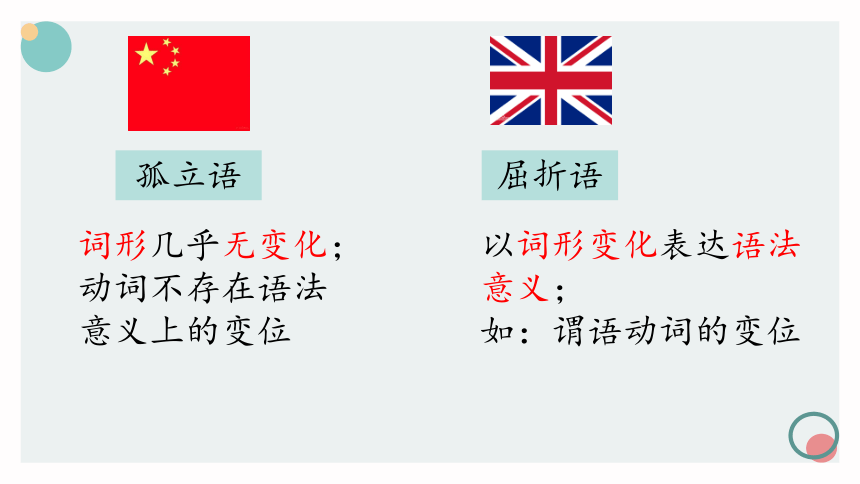
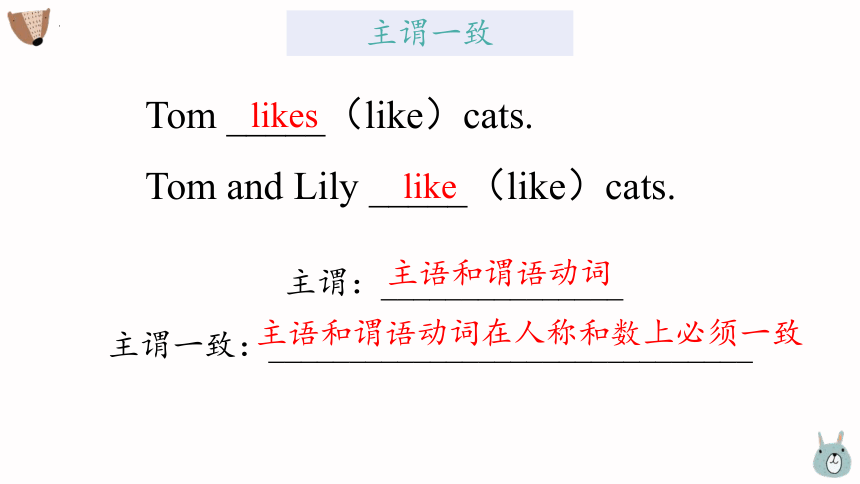

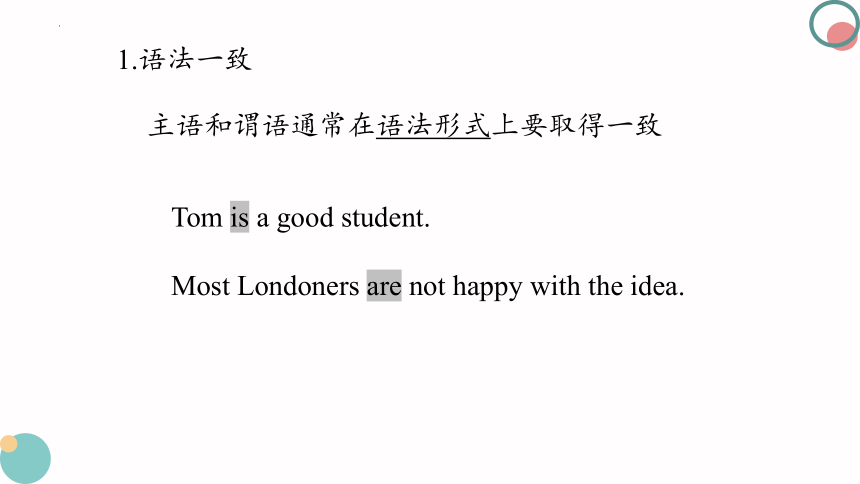
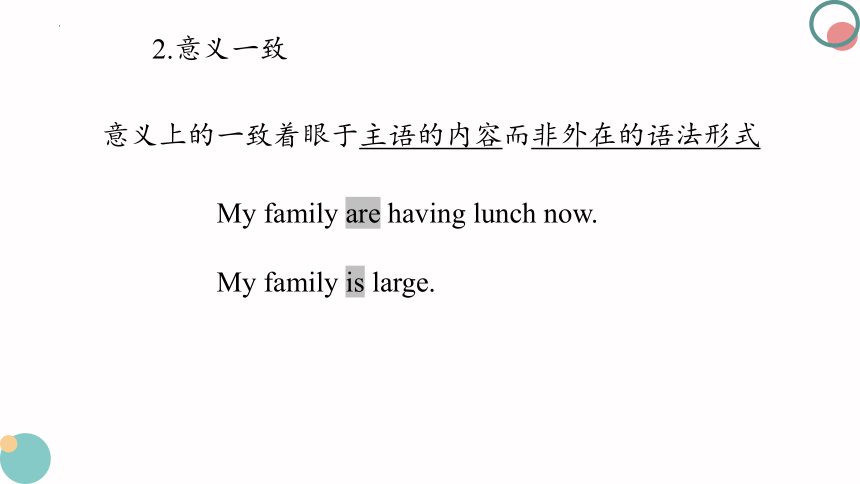
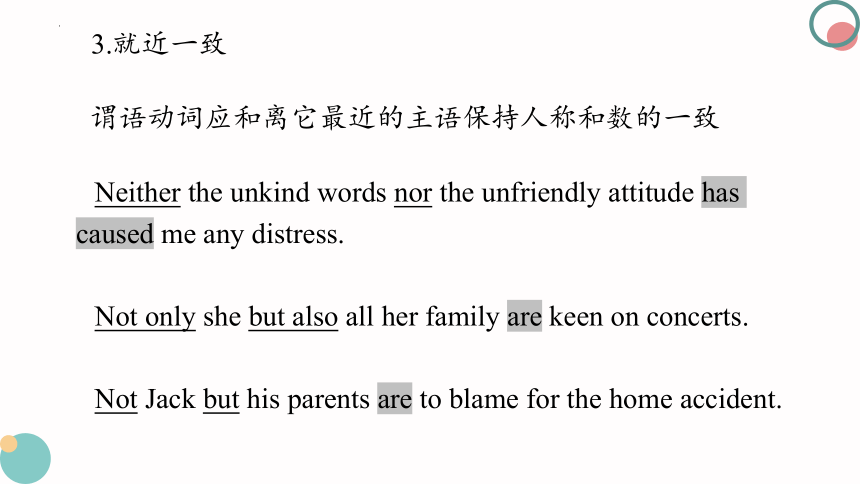

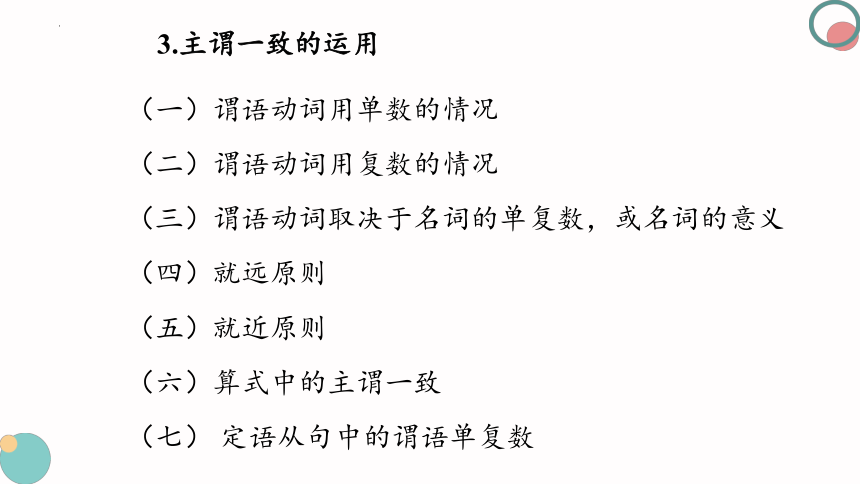

文档简介
(共85张PPT)
主谓一致
1.认识主谓一致
3.主谓一致的运用
2.三原则
我是兔子。
你是兔子。
他是兔子。
我们是兔子。
I am a rabbit.
You are a rabbit.
He is a rabbit.
We are rabbit.
孤立语
词形几乎无变化;
动词不存在语法意义上的变位
屈折语
以词形变化表达语法意义;
如:谓语动词的变位
Tom _____(like)cats.
Tom and Lily _____(like)cats.
likes
like
主谓:_______________
主谓一致:______________________________
主语和谓语动词
主语和谓语动词在人称和数上必须一致
主谓一致
1.认识主谓一致
3.主谓一致的运用
2.三原则
1.语法一致
主语和谓语通常在语法形式上要取得一致
Tom is a good student.
Most Londoners are not happy with the idea.
2.意义一致
意义上的一致着眼于主语的内容而非外在的语法形式
My family are having lunch now.
My family is large.
3.就近一致
谓语动词应和离它最近的主语保持人称和数的一致
Neither the unkind words nor the unfriendly attitude has caused me any distress.
Not only she but also all her family are keen on concerts.
Not Jack but his parents are to blame for the home accident.
1.认识主谓一致
3.主谓一致的运用
2.三原则
3.主谓一致的运用
(一)谓语动词用单数的情况
(二)谓语动词用复数的情况
(三)谓语动词取决于名词的单复数,或名词的意义
(四)就远原则
(五)就近原则
(六)算式中的主谓一致
(七) 定语从句中的谓语单复数
(一)谓语动词用单数的情况
1.单数名词/代词、不可数名词作主语时
A ball is on the floor.
Some water is in the bottle.
2.(1)many a+单数名词
more than one+单数名词
a/an+单数名词+or two/and a half
Many a student has passed the exam.
More than one person was injured in the accident.
A year and a half has passed.
(2)“more+可数名词复数+than one”结构中
谓语动词常用复数形式
More experts than one are against his suggestion.
(3)“more than one hundred+可数名词复数”作主语时,
谓语动词用复数形式(中心词是复数)
More than one hundred tourists have joined this day trip.
3.主语是表示时间、重量、距离、金额等的复数名词时
A hundred miles is a long distance.
Two months is a long holiday.
Three thousand dollars is quite a lot of money for a boy.
4.主语是
“each/every/no+单数名词+and (+each/every/no)+单数名词”
Each boy and each girl has got a seat.
5.(1)“one and a half+可数名词复数”作主语时,
One and a half week is all I can spare.
(2)“one in+基数词”作主语,相当于“几分之一”的用法,该结构作主语或修饰主语时,谓语动词也用单数形式
It is reported that in this area one in five people suffers from heart attack.
6.单个to do、doing作主语时
Doing eye exercises is good for your eye.
Reading novels and solving equations are different assignments.
7.(1)“a/an+单数名词+or two”作主语,
谓语动词用单数
A student or two has failed the exam.
(2)“one or two+名词复数”作主语时,
谓语动词用复数形式。
One or two students were cleaning the windows yesterday afternoon.
8.(1)以-ics结尾的表示学科的名词作主语时,
谓语动词用单数
如:politics,statistics,economics,physics等。
Physics is one of my favorite subjects.
(2)如果这些以-ics结尾的学科名词转义表示具体实践活动、性能、现象等时,则是复数名词,谓语动词要用复数形式。
His politics are very radical.
9.以复数形式出现的专有名词作主语时,如国名、人名、书名、组织机构名等,要用单数形式。
The New York Times is a popular newspaper in the US.
10.名词性从句作主语,谓语动词用单数;
主句为系表结构时,主句谓语由作表语的名词或代词决定。
Where the English evening will be held has not yet been announced.
What the boy wants is a toy, and what his sister wants are some storybooks.
What he left here were lots of books.
11.(1)独立的不定代词作主语时,
谓语动词常用单数形式
常见的这类不定代词有:either, neither, each, one, the other, another, someone类的复合不定代词。
Nobody knows exactly how many species.
Everyone was calm.
Another is to ensure that all children complete primary education.
Each of them has an English dictionary.
(2)某些不定代词作主语时,谓语动词的单复数取决于其所指的内容
这些不定代词有all, some, any, more, most,以及the rest, half等。
All of these processes are a form of natural evolution.
All I want is peace and quietness.
12.much类或此类词修饰的名词作主语
即指代或修饰不可数名词的词,
如a little,much,a great deal of,a large amount of,作主语,或修饰不可数名词作主语,谓语动词用单数形式。
A little freedom is all I ask.
Much information has been written down.
1.Every boy and every girl ____ present ____ the farewell party yesterday.
A.was; to B.was; at
C.were; at D.were; to
B
2.It is reported that more than one politician _____ in this scandal.
A.has involved
B.has been involved
C.have been involved
D.have involved
B
3.Many a student ____ a walk on campus after dinner. But many students ____ computer games in the dormitory.
A.takes; play
B.take; play
C.took; play
D.have taken; have played
A
4.One hundred and twenty kilometers per hour ____ usually the speed limit for cars on the freeway.
A.are B.is C.have D.had
B
5.Attending concerts on the campus ____ part of the pleasure of college life.
A.are B.is C.it is D.being
B
6.Everybody in the office ____ how to operate the computer.
A.know
B.is know
C.were known
D.knows
D
7.Growing vegetables ___ constantly watering.
A.needed
B.are needed
C.were needed
D.needs
D
(二)谓语动词用复数的情况
(二)谓语动词用复数的情况
1.复数名词(代词)作主语,谓语动词用复数。
The students are playing football on the playground.
2.某些集体名词作主语时,谓语动词只能用复数形式
如:people(人们),police(警擦),cattle(牛群)等。
Police were very shocked by the robbery.
注意:
某些集体名词作主语时,谓语动词的单复数取决于该词的具体含义
如果作为整体看待,谓语动词用单数形式;
如果作为多个个体来看待,谓语动词用复数形式
audience(观众),army(军队),class(班级),
crew(全体船员),company(公司),crowd(人群),enemy(敌人),family(家庭),group(组),government(政府),public(公众),population(人口),team(队)......
Our group are going to visit the chimps in the forest.
My family is a large one and the whole family are music lovers.
3.(1)“the+形容词/分词”作主语时
表示一类人或事物,谓语动词用复数形式;
指个别人或表示抽象概念,谓语动词则用单数形式
这类搭配有the old, the young, the deaf, the blind, the dead, the rich, the poor, the living, the injured......
The injured have been sent to the nearest hospital immediately.
The beautiful gives pleasure to all.
(2)“the+姓氏的复数”表示“某某夫妇或一家人”,作主语时,谓语动词用复数。
The Greens are having lunch now.
4.“both...and...”连接并列主语时,谓语动词用复数。
Both New York and London have traffic problems.
5.以-s结尾的海峡、山脉、群岛等作主语时,谓语动词常用复数形式。
The Philippines are in the western Pacific Ocean.
6.某些以复数形式结尾的名词,谓语动词只能用复数形式
如:belongings(财产,所有物),leavings(剩余物),earnings(所得,收入),thanks(感激),goods(货物),savings(储蓄)......
The family were saved in the Wenchuan earthquake but all the belongings were lost.
All my savings are intended for the poor children of the mountains villages.
7.由两个对应部分组成的一个整体的名词作主语时,其内容是复数的,谓语动词用复数形式
此类词有glasses(眼镜),trousers(裤子),shoes(鞋子),scissors(剪刀),clothes(衣服),compasses(圆规),chopsticks(筷子),pants(裤子)等
但若此类词被a set/pair of 等量词修饰时,则由量词的单复数决定谓语动词的单复数形式。
Your glasses are on your nose.
This pair of shoes is under the bed.
8.several类词或此类词修饰的名词作主语
即指代或修饰可数名词复数的词,如several,a few,quite a few,a great many (of...),作主语或修饰可数名词复数作主语时,谓语动词用复数形式。
Quite a few have seen this Indian film.
Several of them are determined to work in the country after graduation.
9.(1)and连接并列主语时,谓语动词常常用复数
English and Chinese are quite different languages.
The bread and the butter are on sale.
(2)and连接的并列主语指同一人或同一物时,
谓语动词用单数
The teacher and video creator is a rabbit.
The teacher and the video creator are rabbits.
If law and order is not preserved, neither the citizen nor his property is safe.
用and连接的词组表示一个概念:law and order 法制 soap and water肥皂水a cup and saucer 茶杯碟子 fork and knife刀叉 the needle and thread针线
trial and error反复尝试,不断摸索 horse and carriage马车
time and tide岁月 bread and butter奶油面包
the ebb and flow盛衰,潮涨潮落
(3)由and连接的两个或更多的主语之前有each, every, many a/an, no时,谓语动词用单数形式
Each book and (each) paper is found in its place.
No teacher and (no) student was here.
10.(1)“a number of+可数名词复数”、
“a variety of +可数名词复数”作主语,谓语用复数形式。
A number of cars are parked in front of the building.
(2)“the number of+可数名词复数”,意为“ ......的数目”;“the variety of+可数名词复数”,意为“......的种类”,
作主语时,谓语用单数形式
The number of the students is over eight hundred.
A number of teachers are present today, and the number of them is 500.
8.The rich ___ not always happy.
A.is B.has C.have D. are
D
9.The committee ____ among themselves for four hours.
A.has been arguing
B.has been argued
C.have been arguing
D.have been argued
C
10.The singer and dancer ____ to make a speech this afternoon.
A.is B.are
C.is about D.are about
A
11.The number of private colleges ____.
A.are increasing
B.have been increased
C.have increased
D.has increased
D
(三)谓语动词取决于名词的单复数,或名词的意义
1.一些表示数量的短语与名词连用时,谓语动词的数取决于名词的数。
如:a lot of, lots of, plenty of, heaps of, half of, two thirds of, eighty percent of, part of, rest of, none of, most of, some of...
None of us have/has ever been abroad.
None of the money was paid to me.
There is plenty of water in the bucket.
There are plenty of eggs in the box.
2.单复数同形的名词作主语时,谓语动词的单复数形式应根据该名词所表达的单复数概念而定。
常见的这类名词有:crossroads(十字路口),means(方法,手段),Chinese(中国人),series(系列),deer(鹿),sheep(羊),fish(鱼),species(物种),headquarters(总部),works(工厂),Japanese(日本人)...
The steel works lies in the east of the town.
The Chinese are the friendliest people I have ever met.
Some fish attract other fish with a light on their body—and then eat them!
知识要点:
work表示“作品”时,其单数形式为work,复数形式为works
War and Peace is a great work.
Have you ever read the works of Shakespeare
3.“分数词+of”作主语
主语是“分数+of”时,要根据of后的名词来确定谓语动词的单复数形式。
Eighty percent of the highway has been completed so far.
About two thirds of the Earth’s surface is covered by the seas which are home to millions of species of plants and animals.
4.all, most, half, enough, some, the rest, the remainder这些词也可以单独作主语,一般遵循意义一致原则
Although his many examples were all right, the remainder were not exact.
5.the rest (of)类词作主语
the rest (of),the remaining, part (of)等词或短语作主语,或者是它们所修饰的名词或代词作主语,
其谓语动词应根据主语所表达的单复数意义而定。
Many workers went home, and the rest of were in the workshop.
The rest of his time was spent in playing games.
6.some类词作主语或修饰的名词作主语。
some,plenty of,a lot (of),lots of等既可以修饰可数名词复数,又可以修饰不可数名词的词,
其谓语动词的单复数取决于所修饰的名词的单复数形式。
A lot of parents are coming to the meeting.
A lot of work is to be done to prepare for the World Expo.
7.a quantity (of)和(large) quantities (of)修饰名词作主语时,其谓语动词应根据quantity的单复数形式而定。
A large quantity of milk was reported not to reach the standard.
Quantities of nuts are on the table.
12.Lots of advice ____ to them on how to fight against sandstorms.
A.has given B.are given
C.was given D.already gave
C
13.Two thirds of the books ____ sold out but only 10 percent of the income ____ to me.
A.was; were
B.was; was
C.were; was
D.were; were
C
14.Ten percent of the workers in this city ____ now on strike.
A.is
B.are
C.is to be
D.are to be
B
(四)就远原则
主语带有together with, along with, such as, accompanied by, as well as, no less than, except, besides, with, combined with, in addition to, including, rather than, like等附加成分时,谓语的数不受附加成分的影响,仍然与主语保持一致。
Mike with his father has been to England.
I as well as they am ready to help you.
(they与I并列主语,用主格,不用them)
(五)就近原则
当not only...but (also), ...not...but..., or, either...or.., neither...nor...等连接并列主语时,以及在there be句型中,谓语动词的单复数形式采用就近一致原则。
Neither Jack nor I have seen this film.
Either you or he is to attend the meeting tomorrow.
15.There ____ a bottle of wine and a half left at home.
A.is B.are C.have been D.has had
A
16.Neither Bill nor his parents ___ at home.
A.is B.are C.has D.was
B
17.Neither I nor my colleagues ____ that the director is going to resign.
A.knows B.know
C.has known D. is to know
B
18.His wife as well as he ____ invited to the business party.
A.has been B.have been
C.has D. are
A
(六)算式中的主谓一致
(1)两数相加或相乘
两数相加或相乘时,谓语动词可以用单数形式,也可以用复数形式。
Sixteen and four is/are/makes/make/equals/equal/is equal to/are equal to twenty.
Three times five is/are/makes/make/equals/equal/is equal to/are equal to fifteen.
(2)两数相减或相除
两数相减或相除时,谓语动词用单数形式。
Eighteen minus eight is/leaves/makes/equals/is/equal to ten.
Twenty divided by four is/makes/is equal to five.
(七) 定语从句中的谓语单复数
定语从句谓语的单复数应该与先行词的单复数保持一致。当定语从句的先行词是“one of+复数形式”时,谓语动词应用复数形式;而当one之前有the only修饰时,谓语动词应用单数形式。
He is one of those persons who always think they are right.
He is the only one of the children who is afraid of going out alone at night.
19.Jack is one of the foreign experts who ____ in China now.
A.works
B.is working
C.are working
D.has been working
C
20.Lily is the only one of the students who ____ to Shanghai.
A.have gone
B.have been
C.has been
D.had gone
C
主谓一致
1.认识主谓一致
3.主谓一致的运用
2.三原则
我是兔子。
你是兔子。
他是兔子。
我们是兔子。
I am a rabbit.
You are a rabbit.
He is a rabbit.
We are rabbit.
孤立语
词形几乎无变化;
动词不存在语法意义上的变位
屈折语
以词形变化表达语法意义;
如:谓语动词的变位
Tom _____(like)cats.
Tom and Lily _____(like)cats.
likes
like
主谓:_______________
主谓一致:______________________________
主语和谓语动词
主语和谓语动词在人称和数上必须一致
主谓一致
1.认识主谓一致
3.主谓一致的运用
2.三原则
1.语法一致
主语和谓语通常在语法形式上要取得一致
Tom is a good student.
Most Londoners are not happy with the idea.
2.意义一致
意义上的一致着眼于主语的内容而非外在的语法形式
My family are having lunch now.
My family is large.
3.就近一致
谓语动词应和离它最近的主语保持人称和数的一致
Neither the unkind words nor the unfriendly attitude has caused me any distress.
Not only she but also all her family are keen on concerts.
Not Jack but his parents are to blame for the home accident.
1.认识主谓一致
3.主谓一致的运用
2.三原则
3.主谓一致的运用
(一)谓语动词用单数的情况
(二)谓语动词用复数的情况
(三)谓语动词取决于名词的单复数,或名词的意义
(四)就远原则
(五)就近原则
(六)算式中的主谓一致
(七) 定语从句中的谓语单复数
(一)谓语动词用单数的情况
1.单数名词/代词、不可数名词作主语时
A ball is on the floor.
Some water is in the bottle.
2.(1)many a+单数名词
more than one+单数名词
a/an+单数名词+or two/and a half
Many a student has passed the exam.
More than one person was injured in the accident.
A year and a half has passed.
(2)“more+可数名词复数+than one”结构中
谓语动词常用复数形式
More experts than one are against his suggestion.
(3)“more than one hundred+可数名词复数”作主语时,
谓语动词用复数形式(中心词是复数)
More than one hundred tourists have joined this day trip.
3.主语是表示时间、重量、距离、金额等的复数名词时
A hundred miles is a long distance.
Two months is a long holiday.
Three thousand dollars is quite a lot of money for a boy.
4.主语是
“each/every/no+单数名词+and (+each/every/no)+单数名词”
Each boy and each girl has got a seat.
5.(1)“one and a half+可数名词复数”作主语时,
One and a half week is all I can spare.
(2)“one in+基数词”作主语,相当于“几分之一”的用法,该结构作主语或修饰主语时,谓语动词也用单数形式
It is reported that in this area one in five people suffers from heart attack.
6.单个to do、doing作主语时
Doing eye exercises is good for your eye.
Reading novels and solving equations are different assignments.
7.(1)“a/an+单数名词+or two”作主语,
谓语动词用单数
A student or two has failed the exam.
(2)“one or two+名词复数”作主语时,
谓语动词用复数形式。
One or two students were cleaning the windows yesterday afternoon.
8.(1)以-ics结尾的表示学科的名词作主语时,
谓语动词用单数
如:politics,statistics,economics,physics等。
Physics is one of my favorite subjects.
(2)如果这些以-ics结尾的学科名词转义表示具体实践活动、性能、现象等时,则是复数名词,谓语动词要用复数形式。
His politics are very radical.
9.以复数形式出现的专有名词作主语时,如国名、人名、书名、组织机构名等,要用单数形式。
The New York Times is a popular newspaper in the US.
10.名词性从句作主语,谓语动词用单数;
主句为系表结构时,主句谓语由作表语的名词或代词决定。
Where the English evening will be held has not yet been announced.
What the boy wants is a toy, and what his sister wants are some storybooks.
What he left here were lots of books.
11.(1)独立的不定代词作主语时,
谓语动词常用单数形式
常见的这类不定代词有:either, neither, each, one, the other, another, someone类的复合不定代词。
Nobody knows exactly how many species.
Everyone was calm.
Another is to ensure that all children complete primary education.
Each of them has an English dictionary.
(2)某些不定代词作主语时,谓语动词的单复数取决于其所指的内容
这些不定代词有all, some, any, more, most,以及the rest, half等。
All of these processes are a form of natural evolution.
All I want is peace and quietness.
12.much类或此类词修饰的名词作主语
即指代或修饰不可数名词的词,
如a little,much,a great deal of,a large amount of,作主语,或修饰不可数名词作主语,谓语动词用单数形式。
A little freedom is all I ask.
Much information has been written down.
1.Every boy and every girl ____ present ____ the farewell party yesterday.
A.was; to B.was; at
C.were; at D.were; to
B
2.It is reported that more than one politician _____ in this scandal.
A.has involved
B.has been involved
C.have been involved
D.have involved
B
3.Many a student ____ a walk on campus after dinner. But many students ____ computer games in the dormitory.
A.takes; play
B.take; play
C.took; play
D.have taken; have played
A
4.One hundred and twenty kilometers per hour ____ usually the speed limit for cars on the freeway.
A.are B.is C.have D.had
B
5.Attending concerts on the campus ____ part of the pleasure of college life.
A.are B.is C.it is D.being
B
6.Everybody in the office ____ how to operate the computer.
A.know
B.is know
C.were known
D.knows
D
7.Growing vegetables ___ constantly watering.
A.needed
B.are needed
C.were needed
D.needs
D
(二)谓语动词用复数的情况
(二)谓语动词用复数的情况
1.复数名词(代词)作主语,谓语动词用复数。
The students are playing football on the playground.
2.某些集体名词作主语时,谓语动词只能用复数形式
如:people(人们),police(警擦),cattle(牛群)等。
Police were very shocked by the robbery.
注意:
某些集体名词作主语时,谓语动词的单复数取决于该词的具体含义
如果作为整体看待,谓语动词用单数形式;
如果作为多个个体来看待,谓语动词用复数形式
audience(观众),army(军队),class(班级),
crew(全体船员),company(公司),crowd(人群),enemy(敌人),family(家庭),group(组),government(政府),public(公众),population(人口),team(队)......
Our group are going to visit the chimps in the forest.
My family is a large one and the whole family are music lovers.
3.(1)“the+形容词/分词”作主语时
表示一类人或事物,谓语动词用复数形式;
指个别人或表示抽象概念,谓语动词则用单数形式
这类搭配有the old, the young, the deaf, the blind, the dead, the rich, the poor, the living, the injured......
The injured have been sent to the nearest hospital immediately.
The beautiful gives pleasure to all.
(2)“the+姓氏的复数”表示“某某夫妇或一家人”,作主语时,谓语动词用复数。
The Greens are having lunch now.
4.“both...and...”连接并列主语时,谓语动词用复数。
Both New York and London have traffic problems.
5.以-s结尾的海峡、山脉、群岛等作主语时,谓语动词常用复数形式。
The Philippines are in the western Pacific Ocean.
6.某些以复数形式结尾的名词,谓语动词只能用复数形式
如:belongings(财产,所有物),leavings(剩余物),earnings(所得,收入),thanks(感激),goods(货物),savings(储蓄)......
The family were saved in the Wenchuan earthquake but all the belongings were lost.
All my savings are intended for the poor children of the mountains villages.
7.由两个对应部分组成的一个整体的名词作主语时,其内容是复数的,谓语动词用复数形式
此类词有glasses(眼镜),trousers(裤子),shoes(鞋子),scissors(剪刀),clothes(衣服),compasses(圆规),chopsticks(筷子),pants(裤子)等
但若此类词被a set/pair of 等量词修饰时,则由量词的单复数决定谓语动词的单复数形式。
Your glasses are on your nose.
This pair of shoes is under the bed.
8.several类词或此类词修饰的名词作主语
即指代或修饰可数名词复数的词,如several,a few,quite a few,a great many (of...),作主语或修饰可数名词复数作主语时,谓语动词用复数形式。
Quite a few have seen this Indian film.
Several of them are determined to work in the country after graduation.
9.(1)and连接并列主语时,谓语动词常常用复数
English and Chinese are quite different languages.
The bread and the butter are on sale.
(2)and连接的并列主语指同一人或同一物时,
谓语动词用单数
The teacher and video creator is a rabbit.
The teacher and the video creator are rabbits.
If law and order is not preserved, neither the citizen nor his property is safe.
用and连接的词组表示一个概念:law and order 法制 soap and water肥皂水a cup and saucer 茶杯碟子 fork and knife刀叉 the needle and thread针线
trial and error反复尝试,不断摸索 horse and carriage马车
time and tide岁月 bread and butter奶油面包
the ebb and flow盛衰,潮涨潮落
(3)由and连接的两个或更多的主语之前有each, every, many a/an, no时,谓语动词用单数形式
Each book and (each) paper is found in its place.
No teacher and (no) student was here.
10.(1)“a number of+可数名词复数”、
“a variety of +可数名词复数”作主语,谓语用复数形式。
A number of cars are parked in front of the building.
(2)“the number of+可数名词复数”,意为“ ......的数目”;“the variety of+可数名词复数”,意为“......的种类”,
作主语时,谓语用单数形式
The number of the students is over eight hundred.
A number of teachers are present today, and the number of them is 500.
8.The rich ___ not always happy.
A.is B.has C.have D. are
D
9.The committee ____ among themselves for four hours.
A.has been arguing
B.has been argued
C.have been arguing
D.have been argued
C
10.The singer and dancer ____ to make a speech this afternoon.
A.is B.are
C.is about D.are about
A
11.The number of private colleges ____.
A.are increasing
B.have been increased
C.have increased
D.has increased
D
(三)谓语动词取决于名词的单复数,或名词的意义
1.一些表示数量的短语与名词连用时,谓语动词的数取决于名词的数。
如:a lot of, lots of, plenty of, heaps of, half of, two thirds of, eighty percent of, part of, rest of, none of, most of, some of...
None of us have/has ever been abroad.
None of the money was paid to me.
There is plenty of water in the bucket.
There are plenty of eggs in the box.
2.单复数同形的名词作主语时,谓语动词的单复数形式应根据该名词所表达的单复数概念而定。
常见的这类名词有:crossroads(十字路口),means(方法,手段),Chinese(中国人),series(系列),deer(鹿),sheep(羊),fish(鱼),species(物种),headquarters(总部),works(工厂),Japanese(日本人)...
The steel works lies in the east of the town.
The Chinese are the friendliest people I have ever met.
Some fish attract other fish with a light on their body—and then eat them!
知识要点:
work表示“作品”时,其单数形式为work,复数形式为works
War and Peace is a great work.
Have you ever read the works of Shakespeare
3.“分数词+of”作主语
主语是“分数+of”时,要根据of后的名词来确定谓语动词的单复数形式。
Eighty percent of the highway has been completed so far.
About two thirds of the Earth’s surface is covered by the seas which are home to millions of species of plants and animals.
4.all, most, half, enough, some, the rest, the remainder这些词也可以单独作主语,一般遵循意义一致原则
Although his many examples were all right, the remainder were not exact.
5.the rest (of)类词作主语
the rest (of),the remaining, part (of)等词或短语作主语,或者是它们所修饰的名词或代词作主语,
其谓语动词应根据主语所表达的单复数意义而定。
Many workers went home, and the rest of were in the workshop.
The rest of his time was spent in playing games.
6.some类词作主语或修饰的名词作主语。
some,plenty of,a lot (of),lots of等既可以修饰可数名词复数,又可以修饰不可数名词的词,
其谓语动词的单复数取决于所修饰的名词的单复数形式。
A lot of parents are coming to the meeting.
A lot of work is to be done to prepare for the World Expo.
7.a quantity (of)和(large) quantities (of)修饰名词作主语时,其谓语动词应根据quantity的单复数形式而定。
A large quantity of milk was reported not to reach the standard.
Quantities of nuts are on the table.
12.Lots of advice ____ to them on how to fight against sandstorms.
A.has given B.are given
C.was given D.already gave
C
13.Two thirds of the books ____ sold out but only 10 percent of the income ____ to me.
A.was; were
B.was; was
C.were; was
D.were; were
C
14.Ten percent of the workers in this city ____ now on strike.
A.is
B.are
C.is to be
D.are to be
B
(四)就远原则
主语带有together with, along with, such as, accompanied by, as well as, no less than, except, besides, with, combined with, in addition to, including, rather than, like等附加成分时,谓语的数不受附加成分的影响,仍然与主语保持一致。
Mike with his father has been to England.
I as well as they am ready to help you.
(they与I并列主语,用主格,不用them)
(五)就近原则
当not only...but (also), ...not...but..., or, either...or.., neither...nor...等连接并列主语时,以及在there be句型中,谓语动词的单复数形式采用就近一致原则。
Neither Jack nor I have seen this film.
Either you or he is to attend the meeting tomorrow.
15.There ____ a bottle of wine and a half left at home.
A.is B.are C.have been D.has had
A
16.Neither Bill nor his parents ___ at home.
A.is B.are C.has D.was
B
17.Neither I nor my colleagues ____ that the director is going to resign.
A.knows B.know
C.has known D. is to know
B
18.His wife as well as he ____ invited to the business party.
A.has been B.have been
C.has D. are
A
(六)算式中的主谓一致
(1)两数相加或相乘
两数相加或相乘时,谓语动词可以用单数形式,也可以用复数形式。
Sixteen and four is/are/makes/make/equals/equal/is equal to/are equal to twenty.
Three times five is/are/makes/make/equals/equal/is equal to/are equal to fifteen.
(2)两数相减或相除
两数相减或相除时,谓语动词用单数形式。
Eighteen minus eight is/leaves/makes/equals/is/equal to ten.
Twenty divided by four is/makes/is equal to five.
(七) 定语从句中的谓语单复数
定语从句谓语的单复数应该与先行词的单复数保持一致。当定语从句的先行词是“one of+复数形式”时,谓语动词应用复数形式;而当one之前有the only修饰时,谓语动词应用单数形式。
He is one of those persons who always think they are right.
He is the only one of the children who is afraid of going out alone at night.
19.Jack is one of the foreign experts who ____ in China now.
A.works
B.is working
C.are working
D.has been working
C
20.Lily is the only one of the students who ____ to Shanghai.
A.have gone
B.have been
C.has been
D.had gone
C
